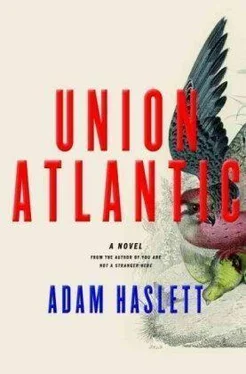Why you? Charlotte thought. Of all I’ve read and forgotten, why a pompous old preacher? Why not Whitman’s singing or blind Milton to keep an aging isolate company?
He rubbed his ear to her foot to relieve an itch. Sensing something was being given out that he was not a part of, Wilkie’s head came down off the sill and he pressed his snout into Charlotte’s lap.
They followed her into the front bedroom, settling on their blankets as she took off her cardigan and began to undress. It had been so much harder living here, all those years ago, at the beginning. Such tense awareness of being alone in the house, the day’s routines acts that she observed herself completing: her dress returned to its hanger, her shoes put back in their sleeve pockets hanging inside the closet door, the watch on the bedside table, cold cream on her face, the bedroom door shut. To forget a bit, the past and herself, that’s all she’d wanted then. To move unsurveilled through time’s ceaseless unfolding. The critical eye closed, the narrative intelligence laid to rest. Repetition’s welcome victory over event. Up at the sound of the bedside alarm, the school day a prevention of other thoughts, along with the work she carried home. And when, inevitably, retrospect intervened nonetheless, she knew, then as now, that others would consider her precious or sad or both, prey to a romanticism gone morbid. So her mother had thought until she died. So Henry still imagined. And who was she to catalogue the varieties in which love and comfort came in order to tell them they were wrong? She could only know what she had felt, say, on the afternoon during that long summer of theirs when they’d stood together in the Metropolitan Museum looking at a small picture by Daubigny, a painting of a village along a river’s edge at dusk seen from across the water, light and peacefulness so miraculously captured it produced in her elation. Before she uttered a word of praise, Eric took her hand and said that from whatever he read or studied, all he wanted was the power to describe how a human being could arrive at the lucid sympathy this man must have felt for what he saw. A lucid sympathy. Those were his words. As if he’d reached into her, discerned an emotional thought still unformed, and allowed it definite shape. Difficult not to think you could live a lifetime with another person and never be as richly acknowledged. To then lie with this man in the grass of the park, make love to him before dinner, to keep discussing painting after the food was cold and the time to catch a film had passed. What did they know of that?
Best she move on after that sort of thing. That’s what the landlord had told Henry when Charlotte asked him to phone and find out why the man hadn’t sent her a renewal on her lease or returned her calls. There had been the ambulance, after all, and the neighbors standing in the hall watching.
Half an hour, it had been, that she’d remained sitting there by the front window. She heard the bathroom door close and after a few minutes open once more, then Eric’s steps to the couch. Such a small apartment it was, just the two rooms. There couldn’t have been more than fifteen or twenty feet between them. At first glance, he just looked paler than usual, his body in an odd position, back arched, one arm reaching out to the side, his chin turned down to his chest. At the feel of his hand, she shook him, lightly at first, insisting he open his eyes. Annihilating minutes spent waiting for the medics to arrive, clutching his head in her lap. She had never spoken to his parents. They had been living in sin, after all. His father sounded as if he were choking and had to suck hard for breath. From upstairs, Mrs. Ruskemeyer brought a plate of cucumber sandwiches, white bread with the crusts removed, in perfect English style. Charlotte offered one to the policeman, who smelled it before returning it to the plate.
“You the wife?” he asked.
“No.”
At the sink in her nightgown, Charlotte stood before her mirror now and applied the thick Nivea cream to the tissue-soft wrinkles beneath her eyes, struck with familiar wonder at how deeply grooved in a mind one cut of time could become. No school tomorrow to fill the day, as it had filled her life. And so the window opened, the bars came off, the passersby began to drift into the room where she still sat with Eric as he died, some of them quiet like generations past, others hot with the temper of dogs’ eyes. The membrane porous, the order shuffled. How arrogant, how wrong, for man to believe his animal senses caught the spectrum whole. An adventure time was, if you calmed yourself to its receipt.
On the last morning of leave from her job at Atlantic Securities, Evelyn Jones sat looking out across Lincoln Avenue from the window of her mother’s apartment and saw cars beginning to fill the spaces alongside the Second Baptist Church. A gray Cadillac, rented for the occasion, came to a halt at the curb and Evelyn’s aunt Verna stepped onto the sidewalk, her gloved hand floating up to make sure of her hat and veil. In her early sixties, she still had a slender, elegant figure, defiantly elegant in fact, a body she was supremely aware of and which she deployed in the world as a kind of standing rebuke to all those who had let themselves go. With her flat chest, almost concave stomach, and rounded upper back, she had the torso of a wasp, curved and rigid.
“Your sister’s here,” Evelyn said, turning back into the dimness of the apartment. Her mother sat on the couch in the old, black taffeta dress that she had worn on formal occasions as long as Evelyn could remember, its slight V-neck revealing the wrinkled flesh above her breasts. Her makeup had done an adequate job of concealing the bags under her eyes.
“You plan on being late to your son’s funeral?” Evelyn asked.
Her mother’s eyes scrunched closed and her head tilted up toward the ceiling. “You have no mercy,” she said.
Evelyn crossed to the closet and gathered their coats.
“Are we going or not?”
As they walked up the avenue, her mother took Evelyn’s arm and held it all the way to the doors of the church and then inside, down the aisle to the front pew, where Aunt Verna awaited them. The minister stepped around from the side of the casket to guide them to their place. When everyone had taken their seats again, he moved in front of the altar and welcomed everyone to the service.
As the slow, heavy rhythm of his opening prayer settled over them, Evelyn gazed at the enlarged photograph of her brother propped on the easel beside the shiny white coffin in a garland of iris and lily of the valley: Carson in his red cape and mortarboard set against the standard sky-blue background of the high-school graduation portrait, his slender face nearly lost amidst the utter conventionality of the image, the generic promise of a bright future for the picture’s captive. It was all Evelyn had been able to find in the shambles of her mother’s place. Ten years old at the least. She regretted now that she had bothered. It seemed dishonest, this picture. Her brother hadn’t died in some media-friendly accident — a bus of young people headed to a sporting event or a man trying to save a neighbor in a flood. He’d been shot in the middle of the afternoon in an apartment entryway and left to die.
The minister, who had known Carson but slightly, offered a brief eulogy employing the biographical facts with which Evelyn had furnished him. And then, as arranged, it was Aunt Verna who rose to speak.
“My nephew Carson Jones is dead,” she began, her hands held together at her chest, as though she were lecturing to a group of Sunday-school children. “Some wretched sinner killed him. People always say a part of you dies along with a loved one. They are wrong about that. Part of you doesn’t die. That would be easy. Remove the limb and go on your way. But that isn’t how love is. When a person you love dies they haunt you — no offense to the rites of burial and I’m sure Carson’s soul is up there with the angels — but the fact is their death haunts you, the waste and idiocy of it, the loving soul of that boy, the love he bore his family … that love surely does haunt you. As well it should if you’re going to walk the streets of this world with your God-given eyes open. I know I’m supposed to be up here saying something uplifting, but let’s not deceive ourselves. The world is a hungry place and it swallowed my nephew without a thought. The fact is, he was shot for money. For paper bills. That’s what he died for. It’s not what lived in the better parts of his soul, but it’s what killed him. I’m sorry to say all this, I really am, because Carson was a beautiful young man and his heart was in the right place most of the time, but for those of us who are planning to go on, and I’ll tell you ladies and gentlemen, I am one of them , we can’t pretend and I don’t think the Lord would want us to.
Читать дальше












